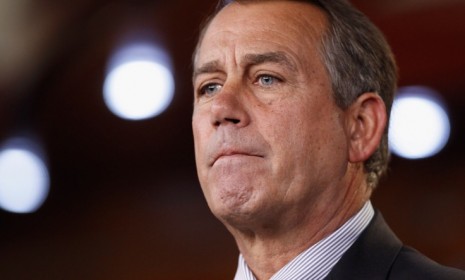Could defaulting on the federal debt really be... no big deal?
Some Republicans argue that failing to raise the debt ceiling wouldn't be as catastrophic as many economists fear

The clock is ticking.... If Congress doesn't raise the $14.3 trillion limit on federal borrowing by early August, the U.S. will run out of money and default on some of its financial obligations. Both the Obama administration and many economists warn that failing to raise the debt ceiling by the deadline could be "catastrophic," but a growing number of Republicans are skeptical. "I don’t think it’s going to have an adverse impact on the economy for the days or weeks or perhaps even months that this would continue," says Sen. Pat Toomey (R-Pa.). Other GOPers say a default could actually be beneficial, by forcing politicians to make difficult decisions. Are the GOP "default deniers" right?
The real catastrophe would be failing to corral spending: Defaulting on our debt due to a technicality wouldn't be "the end of the world," says billionaire money manager Stanley Druckenmiller, as quoted by The Wall Street Journal. If it takes a couple of extra days or weeks to prevent a future full-blown debt crisis like the one in Greece, the markets will understand. It's more important that we deal with "the real problem": Washington's out-of-control spending.
"What if the U.S. Treasury defaults?"
The Week
Escape your echo chamber. Get the facts behind the news, plus analysis from multiple perspectives.

Sign up for The Week's Free Newsletters
From our morning news briefing to a weekly Good News Newsletter, get the best of The Week delivered directly to your inbox.
From our morning news briefing to a weekly Good News Newsletter, get the best of The Week delivered directly to your inbox.
The GOP needs to "get sane": The Obama administration's position is backed by "pretty much every economist on both sides of the aisle," as well as "Wall Street and the business community," says Doug Mataconis at Outside the Beltway. Republicans will have to "swallow hard" and do the right thing by raising the debt ceiling before the deadline. "But I’m going to predict right now that it won’t happen until the absolutely last possible minute. Because, you know, that’s how we do things here."
"Will Republicans get sane on the debt ceiling?"
This battle will only hurt the Tea Party: House Speaker John Boehner may take this fight "down to the wire," says Kevin Drum at Mother Jones, under pressure from the Tea Partiers. But when the deadline comes, the "adults" in the GOP will vote to raise the debt ceiling, rather than commit political "suicide" by letting the U.S. default on its debts. Ultimately, "there's only so much idiocy that even Republicans can put up with," so the GOP establishment will "throw the Tea Partiers under the bus if it looks like they're seriously screwing things up."
"Throwing the Tea Party under the bus"
A free daily email with the biggest news stories of the day – and the best features from TheWeek.com
-
 A lemon-shaped exoplanet is squeezing what we know about planet formation
A lemon-shaped exoplanet is squeezing what we know about planet formationUnder the radar It may be made from a former star
-
 Political cartoons for January 4
Political cartoons for January 4Cartoons Sunday's political cartoons include a resolution to learn a new language, and new names in Hades and on battleships
-
 The ultimate films of 2025 by genre
The ultimate films of 2025 by genreThe Week Recommends From comedies to thrillers, documentaries to animations, 2025 featured some unforgettable film moments
-
 Bari Weiss’ ‘60 Minutes’ scandal is about more than one report
Bari Weiss’ ‘60 Minutes’ scandal is about more than one reportIN THE SPOTLIGHT By blocking an approved segment on a controversial prison holding US deportees in El Salvador, the editor-in-chief of CBS News has become the main story
-
 Has Zohran Mamdani shown the Democrats how to win again?
Has Zohran Mamdani shown the Democrats how to win again?Today’s Big Question New York City mayoral election touted as victory for left-wing populists but moderate centrist wins elsewhere present more complex path for Democratic Party
-
 Millions turn out for anti-Trump ‘No Kings’ rallies
Millions turn out for anti-Trump ‘No Kings’ ralliesSpeed Read An estimated 7 million people participated, 2 million more than at the first ‘No Kings’ protest in June
-
 Ghislaine Maxwell: angling for a Trump pardon
Ghislaine Maxwell: angling for a Trump pardonTalking Point Convicted sex trafficker's testimony could shed new light on president's links to Jeffrey Epstein
-
 The last words and final moments of 40 presidents
The last words and final moments of 40 presidentsThe Explainer Some are eloquent quotes worthy of the holders of the highest office in the nation, and others... aren't
-
 The JFK files: the truth at last?
The JFK files: the truth at last?In The Spotlight More than 64,000 previously classified documents relating the 1963 assassination of John F. Kennedy have been released by the Trump administration
-
 'Seriously, not literally': how should the world take Donald Trump?
'Seriously, not literally': how should the world take Donald Trump?Today's big question White House rhetoric and reality look likely to become increasingly blurred
-
 Will Trump's 'madman' strategy pay off?
Will Trump's 'madman' strategy pay off?Today's Big Question Incoming US president likes to seem unpredictable but, this time round, world leaders could be wise to his playbook